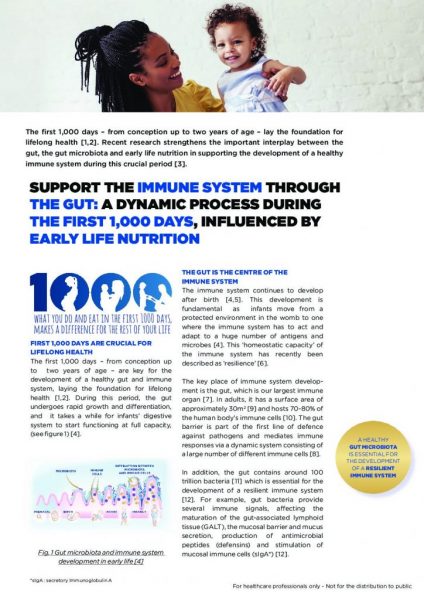It’s important to establish healthy gut microbiota in the first 1,000 days of an infant. Human milk shapes the infant microbiome, which is associated with optimal immune maturation and protection against infections.
Microbial colonization in the gut starts from birth, followed by the dynamic succession of different microbial groups early in life. The development of the gut microbiota from birth through to childhood is critical to establish a healthy symbiosis. Infant nutrition plays a crucial role in this development.
The composition of the gut microbiota changes over time, in response to the infant’s external environment and nutrition. The very first microbes to colonize the gut after birth are bacteria such as E. coli and Streptococci sp. Next, Staphylococcus, Enterococcus and Lactobacillus-like species take over2.
By around one week, Bifidobacterium is the dominant species in human milk-fed infants. The major driver of change is the introduction of weaning foods. With the introduction of solids, the gut is colonized with an increasing number and diversity of bacteria until, around three years of age, the microbiota has stabilized and resembles that of an adult3.
Shaping the infant microbiome in early life
Since this is the period in which infants encounter external stimuli for the first time, this is also the period that the immune system is trained in response to these. A growing body of research suggests an altered composition and activity of the gut microbiota may potentially influence the onset and persistence of several diseases. Gut microbiota perturbations in early life are thought to increase the risk of developing some of these multifactorial diseases, during a time when infant immunity, metabolism and cognition are still in development1.
Human milk is the reference, effectively shaping the infant microbiome, which is associated with optimal immune maturation and protection against infections and potential allergies. Human milk is the best source of nutrition for all infants and breastfeeding has numerous short- and long-term benefits for both infants and mothers1.

Infographic: The development of the gut microbia during the first 1,000 days
References
- Wopereis H, et al. Pediatr Allergy Immuno 2014;25:428-38
- Orrhage K, Nord C. Factors controlling the bacterial colonization of the intestine in breastfed infants. Acta Paediatr Suppl. 1999;88(430):47-57
- Harmsen H, Wildeboer-Veloo A, Raangs G, et al. Analysis of intestinal flora development in breast-fed and formula-fed infants by using molecular identification and detection methods. J Pediatr Gastroenterol Nutr. 2000;30(1):61-67
BA19-485
